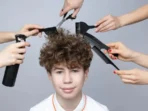There are a number of factors that can cause premature hair graying. These include genetics, a deficiency of vitamins and oxidative stress. Read more wellhealthorganic.com:know-the-causes-of-white-hair-and-easy-ways-to-prevent-it-naturally
White hair can also be caused by an autoimmune disease like vitiligo or alopecia areata, which destroys melanin cells in the scalp. Treatment of these diseases can slow or reverse premature hair graying.
1. Genetics
Genetics is the study of how traits are passed on from one generation to the next. It stems from the work of Gregor Mendel, who studied pea plants and realized that they could pass traits through discrete “units of inheritance.”
This was the first scientific approach to studying heredity. Since then, humans have used the principles of heredity to improve cultivated crops and selectively breed animals.
When it comes to your hair, the process of turning gray or white is also genetic. This occurs when your body stops producing the pigment melanin, which gives hair its color.
But it doesn’t mean that you can’t stop or even reverse this process. In fact, you can prevent your hair from turning white entirely!
There are many things that can cause your hair to turn white, such as a deficiency of vitamin B-12. You may need to take a supplement or eat more foods rich in this vitamin.
Another possibility is stress. It’s been linked to premature white hair because it can cause the stem cells in your melanocytes to be depleted, leading to less melanin production.
Lastly, some diseases or conditions can also make your hair turn white. These include autoimmune diseases, such as alopecia or vitiligo.
If you’re trying to stop or prevent your hair from turning white, it’s a good idea to consult a doctor to determine the cause. They will be able to diagnose the condition and prescribe treatment for it. They might be able to help you find a natural solution that will prevent or reverse this problem.
2. Deficiency of Vitamins
Deficiency of certain vitamins like vitamin B-6, B-12, biotin, and vitamin D can cause premature graying. Similarly, calcium, copper, iron, and protein deficiencies can contribute to premature graying of hair as well.
Fortunately, this issue can be prevented by consuming enough vitamins and minerals through your diet. You can get the nutrients you need from a wide variety of foods including fruits, vegetables, grains, meat, fish, and milk.
If you’re worried that a deficiency of these nutrients may be the culprit behind your white hair, talk to your doctor about taking supplements. This could help bring back the natural color of your hair and reduce your risk for premature aging.
One study from 2015 found that several nutritional deficiencies affect pigmentation and that repigmentation could be possible with supplementation or dietary changes. Vitamin B-12 is particularly important for hair health.
Your doctor can check for a vitamin B-12 deficiency using blood tests or an injection. You can also use fortified foods to ensure you’re getting enough of this vitamin in your diet.
A thyroid condition called hypothyroidism can also cause premature whitening of your hair. Monitor your thyroid levels regularly to be aware of any changes, and if it is underactive, consult a doctor about hormone replacement therapy.
3. Oxidative Stress
White hair is a natural part of aging, but you can prevent it by avoiding certain factors that cause it. Here are a few things to look out for:
Genetics — White hair can be caused by genes that affect your body’s ability to produce color pigments in the hair and skin. It may also occur because you have a disease or condition, like vitiligo, that affects the production of melanin.
Vitamin and mineral deficiencies — A deficiency in nutrients like B-6, B-12, vitamin E, biotin, calcium, copper, iron and zinc can also lead to premature graying of hair. These nutrients are important for creating healthy hair and promoting its growth, so it’s essential to get them in your diet.
Oxidative stress — This imbalance between free radicals and antioxidants can lead to damage to cells, including melanocytes that produce melanin. Studies have linked oxidative stress to conditions like Alzheimer’s and dementia, so reducing it can help you slow down the graying process.
Smoking — People who smoke have a higher chance of developing white hair, as they are more exposed to the damaging effects of nicotine. A simple way to reduce your risk of this is to stop smoking.
Antioxidants – A person’s diet plan plays a major role in preventing white hair, as it can provide you with plenty of naturally occurring antioxidants in the form of fruits, vegetables, nuts, seeds, whole grains and cocoa.
Having a balanced diet and getting plenty of exercise can help you maintain your overall health, which in turn can decrease your chances of premature graying of hair. If you are already experiencing the symptoms of white hair, it’s best to consult with your doctor to discuss treatment options.
4. Hair Dye
White hair is a natural part of aging, but you can prevent it and even reverse the process with some simple steps.
Your hair color is determined by the amount of two different types of melanin in your hair. Known as eumelanin and pheomelanin, the pigments make up the color of your hair.
Over time, exposure to chemicals can cause your hair to lose its melanin. This includes frequent use of dyes and styling products that can strip your hair of its natural color.
It’s also important to avoid harsh chemical treatments, such as peroxide. This can damage your hair and lead to further graying, so it’s best to limit these treatments to a few times a year.
Another way to prevent white hair is to eat a diet rich in antioxidants, which are substances that can help fight oxidative stress. You can find antioxidants in vegetables, fruits, and nuts.
You should also be sure to get adequate amounts of zinc, iron, selenium, and copper. These minerals are essential for the health of your skin and hair.
If you’re having trouble finding enough of these vitamins, talk to your doctor. They can prescribe a supplement that will boost your intake of these nutrients.
You can also try applying henna to your hair, which can add reddish-brown tones that counteract white hair. It can also be used as a treatment for thinning or graying hair. Henna is naturally colored and comes from a plant, so it’s much healthier than most other hair dyes.
5. Sun Damage
It’s no secret that exposure to the sun can cause a lot of damage to your hair. The rays from the sun can dry out your hair and make it dull. It can also leave it brittle, which may lead to split ends and breakage.
Depending on your hair’s color, it will react differently to UV radiation. Light-colored hair, like blond or red, is more susceptible to the sun’s effects than darker shades.
White or blonde hair is especially prone to sun damage because it tends to have a thin cuticle that’s prone to breaking and being damaged. Those with darker or brunette locks are less likely to see sun damage as the pigment in their strands protects them from the rays of the sun.
But if you’re planning on spending a lot of time in the sun this summer, be sure to use products that include sunscreens or other protective ingredients. These can help protect your tresses from the sun’s harmful rays and keep them hydrated, too.
In addition to sunscreens, look for shampoos that are formulated to protect against sun damage. Many of them have UV-absorbing filters that block the damaging rays from your scalp and hair.
Another important way to protect your tresses from the sun is by wearing a hat or scarf when you’re outside. This will not only shade your face, neck and ears but also protect the back of your head from the sun’s rays.
Some people are genetically destined to have premature gray hair. That doesn’t mean you have to accept it or deal with it; you can take preventive measures to slow down the process and possibly reverse it, if you choose.







